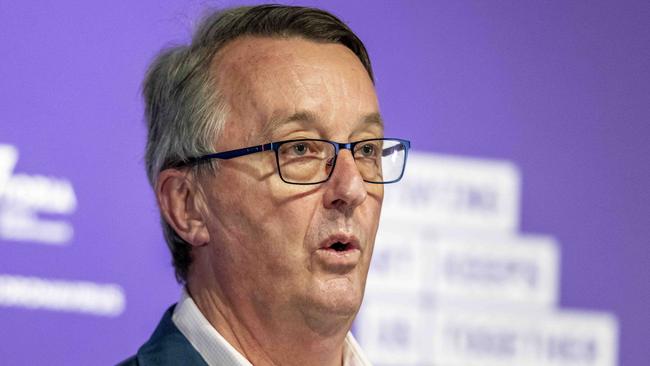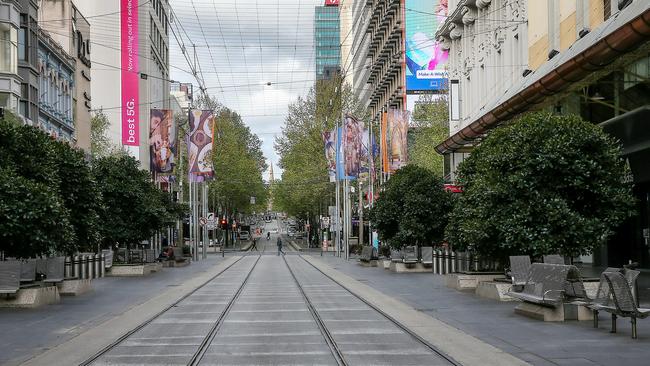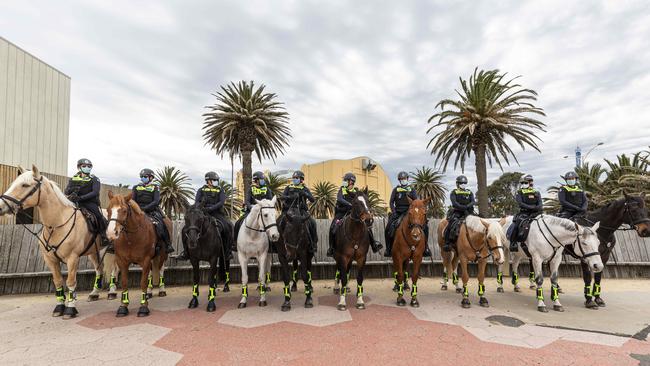11 new cases, no deaths; Melbourne’s 14-day average dips as regional Victoria’s increases
Mystery cases in Victoria are standing in the way of easing restrictions, the Deputy Chief Health Officer has warned. It comes as NSW recorded 12 new coronavirus infections overnight, surpassing locked-down Victoria, which has 11 new cases.
Coronavirus
Don't miss out on the headlines from Coronavirus. Followed categories will be added to My News.
This coronavirus article is unlocked and free to read in the interest of community health and safety. Get full digital access to trusted news from the Herald Sun and Leader for just $1 a week for the first 12 weeks.
Victoria has recorded 11 new cases of coronavirus overnight, and no deaths.
Metropolitan Melbourne’s 14-day rolling average has dipped slightly to 9.7, but regional Victoria’s tally has increased from 0.3 to 0.4.
There are currently 203 active cases and four of those active cases are in regional Victoria.
Seventeen Vctorians are in hospital, one is in intensive care but none are on a ventilator.
Three of the 11 cases are linked to the Frankston family outbreak, one is linked to the Oddfellows Café, one is linked to the Box Hill Hospital outbreak and one is linked to a complex case.
Three of the cases are in Frankston, two in Hobsons Bay and single cases in Boroondara, Brimbank, Melton, Port Phillip, Mildura and Mitchell.
There are 25 healthcare workers among the active cases, along with 50 active cases in aged-care and one in disability care — a staff member.
Authorities have processed 15,298 tests in the past 24 hours.
More than 500 people have been tested in Kilmore and half of those results have been returned.
Mitchell Shire has one new case, which is linked to Kilmore, and there is one new case in Mildura.
Premier Daniel Andrews said he had a high degree of confidence that it would be a false positive. “But for the purposes of an abundance of caution, that is counted in our numbers, but we may well see that reclassified, as we have reclassifications from time to time.”
The Premier thanked the owner of Oddfellows Cafe in Kilmore, the staff and every member of the community who have come forward to be tested.
“Whether it be meticulous record keeping at the cafe, all the way through to a really proactive, really strong and impressive performance by the local community to come forward and be tested, as well as many hundreds of people who are being isolated, not just close contacts but their contacts as well, putting a ring around all of those who may well be positive and may well develop virus, that is no small thing, and a very, very impressive achievement,” he said.
Currently, the Chadstone Shopping Centre cluster stands at 31 cases.
Premier Daniel Andrews has remained tight-lipped on rolling back restrictions on October 18.
“We will not be making the decision for the 18th this weekend. It will be made as close to the 18th as possible,” he said.
“I think it is highly unlikely that nothing will change, there will be some changes.”
NSW RECORDS 12 NEW VIRUS CASES OVERNIGHT
Another 12 cases of COVID-19 have been recorded in NSW overnight, including eight cases of community transmission.
An alert has also been sent out Macquarie University which will undergo a deep clean.
NSW Premier Gladys Berejiklian said five the new cases are linked to a known source.
The remaining three cases are all linked to each other and the source is being investigated by the health department. The other four cases are in hotel quarantine.

PREMIER FLAGS LESS-INVASIVE SALIVA TEST
Premier Daniel Andrews has flagged the importance of saliva testing to tackle the virus.
“I think saliva testing is going to be a bigger part of this, following the important validation through a trial with Victoria Police just recently, where 800 or a thousand members participated in that important trial.”
Saliva testing will be rolled out at Hazeldene chicken farm, near Bendigo, after being trialled in Victoria.
Minister for Health Martin Foley has reinforced the focus on testing. “Testing provides us that critical tool in safely reopening,” he said.
Over the past few weeks the Doherty Institute and the government have been trialling a saliva test.
“It’s still a PCR-based test, as per the nasal, more intrusive program,” Mr Foley said.
He described the test as less invasive and said it had been trialled in Bendigo, the Central City, and Dandenong, with good results.
“That will be less intrusive, but as equally effective as the current, standard PCR test. So, that will be an important, further innovative tool that will allow our crack local public health testing officials and teams to get out into those workplaces, stay ahead of this virus, and deliver the data, the science, and the measuring of how this virus presents in our communities.”

MYSTERY CASES SLOWING EASING OF RESTRICTIONS
Deputy Chief Health Officer Allen Cheng says mystery coronavirus cases are stopping his department from advising the Premier when he could lift restrictions.
He warned Victorians should be on high alert in Dandenong, Altona North, Blackburn, Wyndham, Moreland and Maribyrnong as these were sites with infections.
There were 14 mystery cases, from an unknown source, in Melbourne in the past 14 days, while regional Victoria had none.
Prof Cheng said in Kilmore authorities were taking a very aggressive approach to testing, with the contacts of contacts being asked to isolate to “put a ring around the outbreak”.
He said there were four official cases in the Kilmore cluster and one of those was the person from Chadstone that went up to Kilmore. But health authorities are investigating a possible fifth case.
When asked if Chadstone was now considered low-risk, Prof Cheng said he would expect there may still be ongoing cases, but hopefully in people that have been identified and are already in quarantine.
“We’re still looking, so there’s all the shops are getting doorknocked and encouraged to get tested,” he said. “And we really thank all the Chadstone shops for participating in that. And there’s also the clinics for symptomatic people who may have been customers during that time.”
Frankston has 11 cases, one of which is linked to Chadstone. Chadstone has 31 cases, one of which is linked to the Kilmore cluster.
“In the Frankston households there were three new cases diagnosed yesterday and they actually link those two households together,” Prof Cheng said.
“So that provides the link and fills in some of those missing gaps, which is reassuring to some degree ... having new cases isn’t always a bad thing.
“Obviously, it’s not good for the people, (but) from a public health point of view it does provide us with a bit of reassurance we have links between clusters.”
Prof Cheng said chance played a huge role in determining the spread of infection now the numbers were so low.
“Who are the last people to get this infection, if they happen to have close contacts? Or people that are working from home, live alone, haven’t been out much — then they won’t transmit to anyone and things will resolve very quickly.
“If they happen to be someone who works in a permitted industry, but have been sick for a few days, thought their symptoms were hayfever, didn’t get tested immediately, result in a lot of exposure, have a lot of contacts, live in a large household, for example. Then there’s a potential for what we call a super spreader event and things can get out of hand very quickly.
“It isn’t always the fault of the person, sometimes people spread when they are not infectious, they’re not symptomatic yet. And that chance plays an increasingly large role in determining what happens.
“I think its going to be a day-by-day assessment of the situation. The average in metro Melbourne has dropped to single figures ... in some ways, I’m less worried about that figure than I am about the unknown source cases.”
Because every unknown source case represents at least one person who gave it to them, Prof Cheng said that was the figure that needed to be watched.
He said it was less about the actual number than the situation overall and the unknown sources were causing the most concern.
WOMAN SPITS AT POLICE FOR BEING ASKED TO WEAR MASK
An anti-mask wearing “Karen” out walking her dog in Melbourne has spat at police after they asked her to wear a face covering.
Police said the woman was walking her dog along the side of a road in the Bayside area on Wednesday when officers spotted her without a mask on.
A police spokeswoman said as police approached her she became abusive and spat at the officers’ feet.
“Police directed her to go home and get her mask but she refused to comply and was issued with a fine,” the spokeswoman said.
The disgusting act was among 69 fines issued to Victorians for breaching the chief health officer’s restrictions in the past 24 hours.
Four youths were fined after they were chased down by police who spotted them gathering in a laneway in Dandenong in the city’s southeast.
When police approached the group of young people in the laneway they ran away, but officers gave chase and tracked four of them down.
All four were hit with fines as they were from different addresses and more than 5km from their home.
Another man was fined after he was discovered in a ride share delivery car at the Princes Freeway checkpoint in Little River.
He told police he was travelling to get takeaway fast food but was fined for being more than 5km from home.
At least 12,700 Victorians have now been fined during Victoria’s second wave when stage 3 restrictions were reinstated in Melbourne in early July, a total of more than $20.5 million in infringements.
RADICAL DETENTION PROVISION DITCHED FROM OMNIBUS BILL
The state government has again been forced to back down on controversial coronavirus legislation, scrapping its plans to introduce new powers of detention.
The radical proposal, part of the government’s contentious Omnibus bill, sparked community outrage amid fears the powers would give authorised officers unprecedented and excessive powers.
Officers would have been able to lawfully detain any person they believed posed a risk to the further spread of COVID-19.
Specifically, anyone believed likely to fail to comply with an emergency direction who was a close contact of a person diagnosed with COVID-19 could have been detained.
The detention could have lasted as long as the authorised officer reasonably believed the detainee was likely to fail to comply with an emergency direction.
Premier Daniel Andrews had defended the tough measures, saying they were based on a reasonable belief principle and proportionality principle about the risk of spreading COVID.
“There are some people who are not compliant, refuse to act in a responsible and safe way. Those powers would not be frequently used. They would be, I think, rare. But they are important,” he said at a press conference last month.
“We wouldn’t take these steps if we didn’t believe they were proportionate to the challenge we face. We are in unprecedented times.”
The Omnibus bill was passed by the parliament’s lower house, but faced significant opposition in the upper house. Key crossbenchers had been negotiating with the government for more than a week before the government backdown.
Attorney-General Jill Hennessy said on Wednesday the government had agreed to remove the proposed new detention provision from the Omnibus bill currently before the parliament.

It would also clarify the proposed powers to appoint broader classes of Authorised Officers, to specify the powers that Victoria Police and WorkSafe officers would have.
New Authorised Officers would be given only the specific powers relevant to their role, and which they are suitably trained or qualified to use.
“We have always said we would negotiate in good faith,” she said.
“These changes address concerns raised throughout those negotiations while continuing to deliver the temporary, necessary changes we need to respond to the challenges the pandemic presents.”
In August, crossbenchers forced the government to back down on a bid to extend the state of emergency for another year.
MORE NEWS
CRISP DENIES BEING ORDERED TO RETRACT STATEMENT
